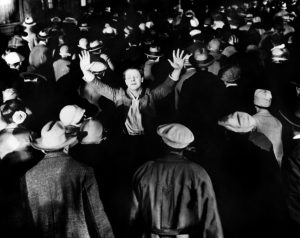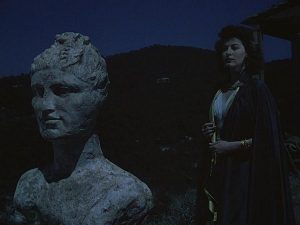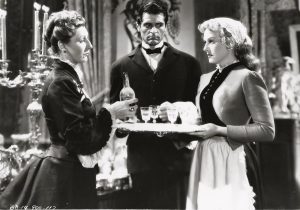Monday, August 20 at 7pm
HEAT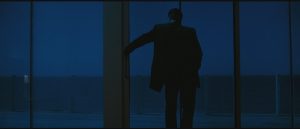
Michael Mann (U.S. 1995) 170 min. DCP. With Al Pacino, Robert De Niro, Val Kilmer.
Touted as “a master of the modern urban noir” (BAMcinematèk), Michael Mann is also the director regularly chosen to open the Monday night series presented in Professor Ken Eisenstein’s “Introduction to Film Studies” course. In Heat (arguably Mann’s masterpiece), “a tightly wound professional thief (De Niro) and a high-achieving LAPD detective (Pacino) are locked in deadly opposition as they vector towards each other. With his typically powerful choreography of action, sense of epic scope and dazzling use of Los Angeles locales, Mann transforms a gripping heist yarn into a fugue-like existential opera.” (Adapted from BAM notes.)
YOU ONLY LIVE ONCE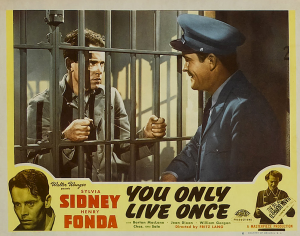
Fritz Lang (U.S. 1937) 86 min. With Henry Fonda, Sylvia Sidney, Barton MacLane.
Made during the 30’s era of social-problem pictures, You Only Live Once is a prison drama and “a powerful attack on the death penalty and the stigmatization of ex-convicts” (The Guardian). Fritz Lang’s career-long concern with the law, and the struggle between individual will and socially determined destiny, is set within a moving love story; the tragic pair – perhaps the original lovers-on-the-run – are sad-eyed Jo (Sidney) and edgy, three-time loser Eddie (Fonda), released from prison with his lawyer’s assurance that he’ll make good. Harrowing scenes of prison and pursuit are rendered in a starkly expressive visual style; but the bleak atmosphere ultimately gives way to pastoral lyricism, suggesting a possibility of spiritual if not social redemption. Asked about the ending, Lang said, “You may laugh, but don’t forget, I was born a Catholic”(Adapted from Pacific Film Archive notes).
TEN MINUTES TO LIVE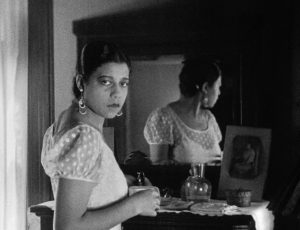
Oscar Micheaux (U.S. 1932) 58 min. With Lawrence Chenault, A.B. DeComathiere, Laura Bowman.
In his seminal essay “Bad Movies,” J. Hoberman describes legendary director Oscar Micheaux as the “Black Pioneer of American film — not just because he was a black man, or because in his youth he pioneered the West, or because he was the greatest figure in ‘race’ movies and an unjustly ignored force in early American cinema. Micheaux is America’s Black Pioneer in the way that André Breton was Surrealism’s Black Pope. His movies throw our history and movies into an alien and startling disarray.” Ten Minutes to Live’s milieu is a Harlem nightclub, where a movie producer attempts to seduce a singer with the promise of a starring role.
playing with…
THE DOCTOR’S DREAM
Ken Jacobs (U.S. 1977) 24 min.
Ken Jacobs’ structural editing strategy discovers the subliminal image in a found film made for television — a movie based on a painting that hangs in London’s Tate Gallery and hides a powerful sexual event within its banality.
Monday, September 10 at 7pm
NEAR DEATH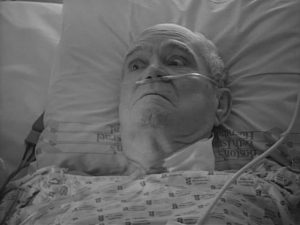
Frederick Wiseman (U.S. 1989) 358 min.
In his portrait of the Medical Intensive Care Unit at Boston’s Beth Israel Hospital, Fred Wiseman, America’s greatest living chronicler of the systems that move our country, is concerned with how people face death. Or, more specifically, the complexity of the interrelationships among patients, families, doctors, nurses, hospital staff and religious advisors – the people confronting the personal, ethical, medical, psychological, religious and legal issues involved in making decisions about whether or not to give life-sustaining treatment to dying patients.
“Wiseman’s great, fearless and monumental six-hour documentary [presents] the sorts of images that become grimly commonplace during the course of a film that is less a viewing experience than a total immersion. It isn’t the running time that makes Near Death so overwhelming; it’s the subject itself. But at this length, the film has time to carry its audience from an initially raw emotional response to a calmer consideration of the difficult issues raised here, and finally on to some sort of resolution.” – Janet Maslin, The New York Times
ALL I DESIRE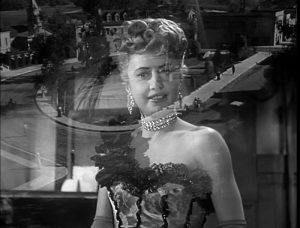
Douglas Sirk (U.S. 1953) 80 min. 35MM. With Barbara Stanwyck, Richard Carlson, Lyle Bettger.
Stanwyck stars as a washed-up actress facing one of her most challenging roles: a successful woman returning to visit the family she abandoned. We quickly see why she left in the first place; as Sirk put it, “she comes back… and finds nothing but this rotten, decrepit middle-class American family.” Yet the dream of home is as powerful as the dream of escape, and the conflicted Stanwyck finds herself inexorably drawn toward a “happy ending” that, in Sirk’s hands, is anything but. As the door swings shut on the family home and the camera pulls back from the bars of the banisters, we can only feel relieved to be on the outside looking in. (Adapted from PFA notes.)
THE CROWD – Not available on home video!
King Vidor (U.S. 1928) ~98 min. 35MM. With James Murray, Eleanor Boardman, Bert Roach. With live musical accompaniment!
A story about the common man that encompasses an intensely human odyssey, The Crowd – much of it shot on location in the streets of New York – resonated in its time with an unprecedented sense of cinematic realism, and its use of montageto express the dehumanization of modern life makes it King Vidor’s masterpiece. “It’s hard to exaggerate the fusion of art and business boldness in this great film… while it is an American attempt at the European art film, it actually did well at the box office. It’s the story of a couple living with the anxiety that they will lose their own identity and become just part of the crowd. But what is most fascinating is the way this is reflected in the nature of film itself—the bright screen and the anonymous, huddled mass” (David Thomson for Pacific Film Archive).
Monday, October 1 at 7pm
YOU WERE NEVER REALLY HERE
Lynne Ramsay (UK/France 2017) 89 min. DCP. With Joaquin Phoenix, Ekaterina Samsonov, Alex Manette.
Scottish auteur Lynne Ramsay roared back into the spotlight with the release of her first feature in six years, the thriller You Were Never Really Here. Joaquin Phoenix plays a hitman dealing with PTSD and his own death drive as he undertakes a dangerous mission to rescue a kidnapped girl. With daring editing and her typically intricate sound design (including a bravura Jonny Greenwood score), Ramsay crafts a gut-punching spectacle that doubles as a psychic X-ray of a scarred mind. Hallucinatory and raw, this was one of the most distinctive films of 2017. (Adapted from BAM notes.)
Monday, October 15 at 7pm
L’ARGENT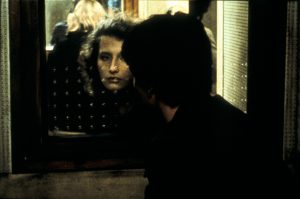
Robert Bresson (France 1983) 85 min. 35MM. With Christian Patey, Sylvie Van Den Elsen, Michel Briguet, Caroline Lang. French with English subtitles.
In his ruthlessly clear-eyed final film, Bresson pushed his unique blend of spiritual rumination and formal rigor to a new level of astringency. Transposing a Tolstoy novella to contemporary Paris, L’argent follows a counterfeit bill as it originates as a prop in a schoolboy prank, then circulates like a virus among the corrupt and the virtuous alike before landing with a young truck driver and leading him to incarceration and violence. With brutal economy, Bresson constructs his unforgiving vision of original sin out of starkly perceived details, rooting his characters in a dehumanizing material world that withholds any hope of transcendence.
Monday, October 22 at 7pm
BRIGADOON
Vincente Minnelli (U.S. 1955) 108 min. 35MM. With Gene Kelly, Van Johnson, Cyd Charisse, Barry Jones.
Vincente Minnelli’s fame is grounded in the numerous musicals he directed, many of which are celebrated as milestones in the history of the genre. Brigadoon is one such highlight, an “exercise in reality abandonment, [wherein] the hero slips into a fantastical dream world (here, a mythical Scottish village) to the music of Lerner & Loewe” (i-Italy). Expressively shot in Technicolor, Brigadoon finds two Americans, a wistful Gene Kelly and his pragmatic friend, Van Johnson, wandering through the Scottish hills when they discover a charmed village. Cyd Charisse lives there, a local lass with a dream of her own…
Monday, October 29 at 7pm
PANDORA AND THE FLYING DUTCHMAN
Albert Lewin (U.S. 1951) 120 min. 35MM. With James Mason, Ava Gardner, Nigel Patrick, Sheila Sim.
Gorgeously restored by George Eastman House, this Technicolor treasure stars James Mason and Ava Gardner in a delirious amalgam of Greek mythology and Germanic seafaring legend. Shot on location in Spain, showcasing the extraordinary artistry of master cinematographer Jack Cardiff (The Red Shoes and Black Narcissus), and demonstrating the romantic sensibility of distinctive director Albert Lewin, Pandora and the Flying Dutchman is “morbid, perverse, grandiloquent… It should be kitsch, and yet carries such conviction that it achieves a kind of crazy grandeur” (Dave Kehr, The New York Times). Preservation by George Eastman House in cooperation with The Douris Corporation, funded by the Film Foundation and the Franco-American Cultural Fund.
Monday, November 5 at 7pm
MRS. WARHOL + IMITATION OF CHRIST
Andy Warhol (U.S. 1966 + 1967-69) TRT 151 min. With Julia Warhola, Patrick Tilden-Close, Brigid Polk, Ondine, Nico.
Continuing to work its way through Andy Warhol’s 600-plus film oeuvre, the Monday Intro to Film series presents a double bill: the preserved Mrs. Warhol, featuring Andy’s mother as “an aging peroxide movie star with a lot of husbands… Casting her as a former Mack Sennett bathing beauty, Warhol follows his delightfully oddball mother as she goes about her daily domestic routines” (Harvard Film Archive); and Imitation of Christ, whose central figure is a beautiful misfit damaged by drugs (Patrick Tilden-Close). His parents (Brigid Polk and Ondine) shoot amphetamines and argue about their son, while the family maid (Nico) reads aloud from De imitatione Christi by Thomas à Kempis, the young man’s favorite book.
Monday, November 12 at 7pm
CHIMES AT MIDNIGHT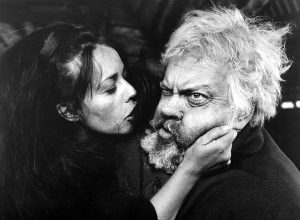
Orson Welles (France/Spain/Switzerland 1966) 113 min. DCP. With Orson Welles, Keith Baxter, John Gielgud, Jeanne Moreau.
Orson Welles’ extraordinary Chimes at Midnight was the culmination of the filmmaker’s lifelong obsession with Shakespeare’s ultimate rapscallion, Sir John Falstaff. Usually a comic supporting figure, Falstaff here becomes the focus: a robustly funny and ultimately tragic screen anti-hero played by Welles with looming, lumbering grace. Integrating elements from both Henry IV plays, as well as Richard II, Henry V and The Merry Wives of Windsor, Welles created a gritty and unorthodox Shakespeare film as a lament, he said, “for the death of Merrie England.” Poetic, philosophical, and visceral—with a kinetic centerpiece battle sequence that rivals anything in the director’s body of work—Chimes at Midnight is as monumental as the figure at its heart.
Monday, November 26 at 7pm
THE FLOWERS OF ST. FRANCIS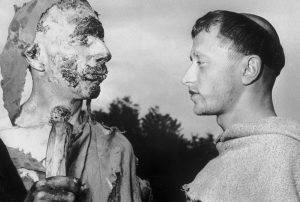
Roberto Rossellini (Italy 1950) 87 min. 35MM. With Brother Nazario Gerardi, Brother Severino Pisacane, Esposito Bonaventura, Aldo Fabrizi. Italian with English subtitles.
In a series of simple and joyous vignettes, director Roberto Rossellini and co-writer Federico Fellini lovingly convey the universal teachings of the People’s Saint: humility, compassion, faith and sacrifice. Gorgeously photographed to evoke the medieval paintings of Saint Francis’ time, and cast with monks from the Nocera Inferiore Monastery, The Flowers of St. Francis is a timeless and moving portrait of the search for spiritual enlightenment.
Monday, December 3 at 7pm
THE DIARY OF A CHAMBERMAID — Preservation Print!
Jean Renoir (U.S. 1946) 88 min. 35MM. With Paulette Goddard, Burgess Meredith, Francis Lederer.
Paulette Goddard plays the ambitious servant whose arrival into an eccentric household of decadent French aristocrats eventually wreaks havoc. Breaking away from the leisurely documentary style found in his previous U.S. film, The Southerner (1945), Renoir’s Diary has a theatrically stylized continental flair. The film’s subversive bitterness and subtle melodramatic nature aptly illustrate the director’s brilliant interweaving of the working and elite classes. Renoir’s lesser-known American films are superb examples of his beautiful craftsmanship. Perhaps producer Darryl Zanuck paid him the ultimate compliment when he said, “Jean’s got a lot of talent, but he’s not one of us.” Preservation print and program notes courtesy of UCLA Film & Television Archive.
“In its own strange way, even more genuinely surreal than Buñuel’s later version of Mirbeau’s novel… what’s so bizarre about Renoir’s adaptation is the sheer artificiality of both setting and performances, emphasizing the power struggles that develop as a theatre of deceit and delusion. Less bitterly savage than Buñuel, but equally sharp in its satire, it stands on an otherwise uncharted point between Rules of the Game and, say, The Golden Coach.” – Time Out, London
